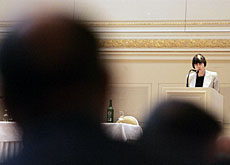
Calmy-Rey wants greater Swiss influence abroad

Foreign Minister Micheline Calmy-Rey has called for a stronger international political role for Switzerland.
She supported the idea of a Swiss seat in the United Nations Security Council and defended her position of “active” Swiss neutrality at the annual conference of Swiss ambassadors in Bern, which opened on Monday.
“Switzerland doesn’t have the critical mass to resolve crises on its own,” she commented.
“Without influence in the Security Council, the necessary financial means or sufficient manpower, our voice is not properly heard during the resolution of… international crises.”
She said a Swiss seat in the Security Council would be a “productive” step forward, as it would strengthen the weight and expertise of the foreign ministry and “improve decision-making within government”.
Calmy-Rey hit out at Switzerland’s foreign policy, which, she said “lacked visibility” and was limited by its own working framework – outside the EU – its lack of multilateral experience and the limited role of Swiss military abroad.
“Our destiny is increasingly dependent on what happens abroad,” she told the diplomats. “We are closely bound up with the process of globalisation and cannot claim to organise ourselves independently.”
Peace-keeping
In her speech, she called for stronger Swiss support for international peacekeeping operations, revealing that the foreign and defence ministries had recently presented a more ambitious strategy to the government.
“Reinforcing our commitment to peacekeeping operations would increase our [political] weight in decision-making bodies,” Calmy-Rey said.
Last week the foreign ministry did not exclude Swiss participation in the UN peacekeeping force in Lebanon, including the sending of troops.
Calmy-Rey emphasised the long way the international community still had to go before becoming a community of states governed by law, citing Iraq, Lebanon, and Sudan as examples of “powerlessness”, in particularly on the part of the UN.
“We should rightly ask ourselves whether our support for the rule of law, given its ineffectiveness, is affecting our very own credibility,” she noted.
In her speech, the foreign minister also lambasted the United States and the European Union on the Lebanon issue.
“Defending its interests in a clear and offensive manner is nothing new for the US,” she noted. “What is new is its unilateral approach and the simplicity of the arguments.”
“Worldwide, everyone is waiting for Europe. Unfortunately the EU is not assuming the place and role that is expected,” she commented.
swissinfo with agencies
The traditional three-day gathering of high-level Swiss diplomats in Bern brings together ambassadors, consuls general and heads of cooperation from the Swiss Agency for Development and Cooperation from August 21-23.
This year’s theme is “Power and influence – the opportunities and limits of a strategy of influence”.
The country has in effect been neutral since 1515 after Swiss forces were defeated by the French at the Battle of Marignano in Italy.
Switzerland’s neutrality was recognised by the signatory states of the Vienna Congress in 1815.
Neutrality in the international context means the non-participation of a state in armed conflict between other nations.
Swiss neutrality was chosen freely, is permanent and allows the country to be armed for defence purposes.

In compliance with the JTI standards
More: SWI swissinfo.ch certified by the Journalism Trust Initiative


























You can find an overview of ongoing debates with our journalists here . Please join us!
If you want to start a conversation about a topic raised in this article or want to report factual errors, email us at english@swissinfo.ch.